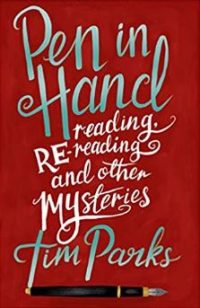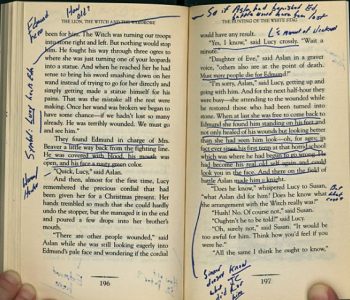Tim Parks’ “Pen in Hand”
 Reviewed by Elisabetta Gasparoni
Reviewed by Elisabetta Gasparoni
Tim Parks’ Pen in Hand is a thought-provoking collection of writings… about reading. From the start Parks suggests that we should all stop sanctifying books, treating them as reverential artefacts, and see them as means to greater understanding. To this end, we should read with a pen in our hand and to make marks on our books, to write in the margins, to substitute words we think work better and to expose the poet’s windy metaphor if we really don’t feel it works. Bend the book; break the spine, fold the pages, scribble your thoughts. In short Parks invites us to become good, active, critical readers.
Parks divides his book into four sections. The first is titled How Could You Like That Book? and alerts us to new ways of considering the narrative by asking what fiction is and how we should approach it. He wonders whether we should re-read the same few books and better develop our literary senses in this way; or whether indulging just one book simply means that you renounce all others. What about the thousands books that you are not reading?
Conversely, why should we read new books? As you can see, there are many convoluted questions and his answers are sometimes not definitive. He almost invites us to reflect with him. In doing so he leaves the door open a little, in order that we might judge for ourselves and form our own opinions.
He carries us through some of the most unusual scenarios and renews the notion that whatever the book, when it is well written, it conquers us. He also says that when we do not understand a book, we should carry on reading as it could bring to us quite different worlds from our own. It is for this reason that he welcomes what some people criticize as the “overproduction” of books. We should read: “with a sense of wonder and curiosity at the general and implacable human determination to fill endless space with dubious mental material when life is short and there are so many other things to be done”.
In Reading and Writing, his second section, he talks about writers’ intentions, in short why do writers write? Parks reflects on those people who imply that genre fiction is a stepping stone to reading literary fiction: like soft to hard drugs, maybe. His own view is that there is no formula to appreciate, or to defer to, literary works and says that anyone who loves books – of whatever ilk – is someone blessed.
The third section is called Malpractice and written for people who have started writing. I found particularly interesting the chapter called Pretty Violence where Parks investigates whether it is wrong to aestheticize violence, be it portraying war or crime scenes. Indeed, when it comes to the social reality of crime and criminality should art be part of the solution as Parks would hope or is it complicit in the problem? The Limits of Satire is another though provoking chapter in which he asks if we have the moral authority to decide to uphold the ancient tradition of satire at all cost. Are there limits?
 Gained and Lost in Translation is the final section of the book, a fascinating exploration into the profession of translators and the complications of translating. Parks points out that translating literature should not be limited to the simple function of informing or persuading but rather “thrives on a superabundance of possible meanings, an openness to interpretation, an invitation to measure what is describes against our experience.”
Gained and Lost in Translation is the final section of the book, a fascinating exploration into the profession of translators and the complications of translating. Parks points out that translating literature should not be limited to the simple function of informing or persuading but rather “thrives on a superabundance of possible meanings, an openness to interpretation, an invitation to measure what is describes against our experience.”
In his final chapter Does Literature Help Us Live? he observes that it does not if we consider the long list of writers who committed suicide and although Parks’ opening remarks to the purpose of literature are not encouraging, his conclusions nevertheless are rather brilliant. He quotes the Italian writer Giacomo Leopardi’s consideration that no matter how grim the story is, if they are works of literature, they are always a source of consolation and renewed enthusiasm.
At the end of the chapter though Parks cannot help but hinting that literature simply keeps us going and keeps the market supplied. In his conclusion (although admittedly, as a curated collection of previous published works, there is no real conclusion) Parks might appear to be a little cynical. However, he knows that in the endless supply of books, we will always find good literature. After completing his book, I am convinced that I can hear his voice whispering to me – in Italian – “just enjoy reading… but make sure that you take notes.”






